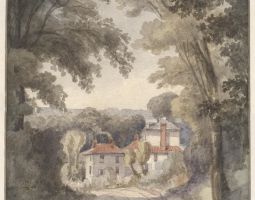Robert Southey and his wife Edith rented this house, now a Grade II listed building, from June 1798-June 1799. Southey described Westbury as 'one of the villages at the end of Durdham Down, two miles from Bristol' and the house as 'a very old one' from which ‘the back view is extensive, & as beautiful as a prospect can be without any characteristic sublimity, which has only hill, & wood to vary it.’ Not long after his arrival at Westbury, Southey writes to his brother he and Edith ‘hesitated between the appropriate names of Rat-Hall, Mouse Mansion, Vermin Villa, Cockroach Castle, Cobweb Cottage & Spider Lodge – but as we routed out the spiders, brushd away the cobwebs, stoppd the rat holes, & found no cock-roaches, we bethought us of the animals without & dubbed it Martin-Hall'. Whilst living at Westbury-on-Trym, Southey wrote magazine contributions, translations, and poetry such as the first of his 'English Ecologues', Madoc, the beginning of Thabala the Destroyer, and published his Poems in two volumes. The poems and ballads he wrote here are his most spontaneous and the settings display an affinity with the Somerset landscapes of his earlier years.Southey’s letter to Charles Danvers, dated the 10th May 1802, reveals the attachment Southey retained for the place: 'Bristol is still the place to which I most cling – very often do I remember Westbury – & wish that the years which are past could return & that the grave could give up its dead’. He loved the garden at Martin Hall, which inspired various poems. One is the sonnet, 'Winter':
1 A wrinkled , crabbed man they picture thee, 2 Old Winter, with a rugged beard as grey 3 As the long moss upon the apple-tree; 4 Blue-lipt, an ice-drop at thy sharp blue nose, 5 Close muffled up, and on thy dreary way, 6 Plodding alone through sleet and drifting snows. 7 They should have drawn thee by the high-heapt hearth, 8 Old Winter! seated in thy great arm'd chair, 9 Watching the children at their Christmas mirth; 10 Or circled by them as thy lips declare 11 Some merry jest or tale of murder dire, 12 Or troubled spirit that disturbs the night, 13 Pausing at times to rouse the mouldering fire, 14 Or taste the old October brown and bright.
Westbury , 1799, from Poetical Works (1838)

